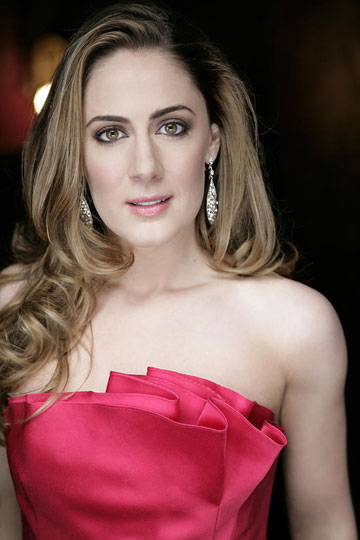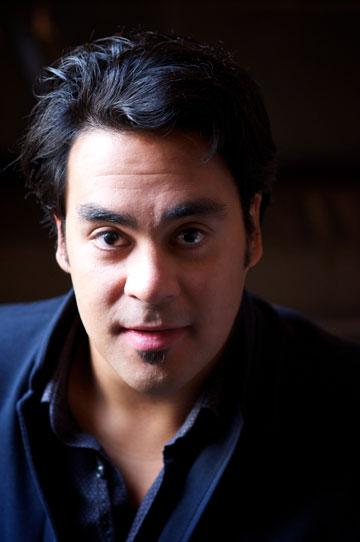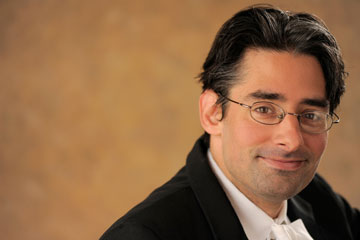Award winning conductor and composer Anthony Barrese arrived in Miami three weeks ago to begin rehearsals for Georges Bizet’s The Pearl Fishers (Les Pêcheurs de Perles), Florida Grand Opera’s second offering of their season, which opened on Saturday, Feb. 28 to an upbeat crowd at the Adrienne Arsht Center.

Syndey Mancasola
Bizet, a piano prodigy, struggled to find his musical identity in his early years, settling into the niche of musical theater after concluding a life of composing symphonic works was not his bag. The musical multiverse continues to wonder what gifts Bizet might have brought if he had lived beyond age 37, leaving only two operas – The Pearl Fishers and Carmen – for us to sink our emotional teeth into.
Pearl Fishers was largely dismissed by the press at its premier in 1863, but was received well by opera consumers. It played intermittently over the next 100 years and, since the mid-twentieth century, has continued to be included in the repertory of opera houses worldwide.
Bizet's gifts for melody and suggestion are clearly evident in his work, rising above the libretti by Eugène Cormon and Michel Carré, musically representing the emotions and distress of the characters.
The setting of ancient Ceylon (now Sri Lanka) was the fantastical canvas on which Bizet painted his exotic tale of friendship and sacrifice.
A tight friendship between Nadir (tenor Philippe Talbot) and Zurga (baritone Corey McKern) was once almost dashed by an alluring priestess, Leïla (soprano Sydney Mancasola), to whom both young men were drawn. The two old friends meet again in a fishing village later in life and renew their vow of eternal friendship, never to let a woman come between them. Enter the virgin priestess of Brahma (Leïla? Of course!) to pray for good weather for the pearl fisherman’s harvest, and the dramatic action is afoot.

Philippe Talbot
These three accomplished voices made their FGO debut; Mancasola clearly the audience fave.
The radiant, svelte and beautiful Mancasola has charm to burn, possessing a voice like fine china, boasting solid technique and effortless pliability in her assignments. Warding off the evil spirits for the fishermen, she navigated the tremendous vocal leaps and runs in the Italian bel canto style "O Dieu Brahma” with confidence, command and suppleness, energizing the crowd at the close of Act One.
Proud and vulnerable in her characterization with low notes as pristine as her highs, Mancasola demonstrated her acting chops and splendid range in “J'étais encore enfant," Leïla telling the high priest Nourabad (bass Burak Bilgili) of her courage in hiding a fugitive from his enemies when she was a little girl. A highlight was "Comme autrefois dans la nuit somber" as Leïla mused on the times when she and Nadir would secretly meet and how he would protect her. This cavatina seemed to almost bewitch the audience as Mancasola beautifully rendered the aria, the passion and resolve for Leïla’s character palpable, coming to grips with her conflict between secular love and her sacred oath.
Mancasola seemed to be operating at a different level than Talbot, who possessed a competent tenor, but without the power required. Mining the depth inherent in Nadir’s troubled soliloquy ("Je crois entendre encore") recalling the broken vow he made to Zurga while still pursuing his love for Leïla, the darkly handsome Talbot was impassioned enough in his character, but he backed off his high “B” money note at the aria’s dramatic moment, missing the opportunity to send that special shiver down the collective spine of the crowd. His voice served him better on "De mon amie," adding a haunting air after Leïla expressed her newfound love for him.

Corey McKern
Mancasola brought her volume down to match Talbot, blending well in their exchange as they declared their love, "Leïla! Leïla!...Dieu puissant, le voilà!" the pair pulling the hunger and urgency out of the duet.
McKern made for a sturdy Zurga, his baritone conveying the love, hurt and betrayal embodied in his fisherman king character. He and Talbot rendered "Au fond du temple saint" with the genuine masculine intimacy Bizet no doubt intended. They avowed in their reunion to be faithful to each other until death. The weight of their relationship, this melody, is a feast for the ears. The orchestra, as if a third voice, blended sublimely with the two men; the subtle swells and the perfect harmonies is one of those moments when the composer gets it just right and the audience immediately knows they have dined on something sumptuous.
This duet is the musical signature of the opera, the motif appearing whenever the issue of the men's friendship arises, often as a delicate shimmer in the strings, at one point perhaps signaling what was going through Zurga’s mind when confronting Leïla with his love and jealousy.
McKern was emotionally conflicted with "L'orage s’est calmé" as he expressed remorse for his anger towards Nadir, demonstrating his rich command across his entire range with restless contemplation and resolution.

Burak Bilgili
McKern’s duets with Mancasola brought color, depth and fire to the stage, the exchange worthy of a modern day Broadway venue. The pair expressed warmth and tenderness in "Je frémis," if not for the text, sounding like a love duet; ramped up the tension with “Quoi! Innocent? Lui, Nadir?”; lit the fuse on "Je suis jaloux" and brought fireworks as Leïla begged for Nadir's life. McKern thundered, jealously refusing mercy and sentencing both Leïla and Nadir to death as Mancasola toggled between her delicate notes and the notes where she pushed out the walls.
The three leads blended with emotion on "Plus de crainte...Rêves d'amour, adieu!" Zurga discovering that Leïla was the child who had saved his life, tells her and Nadir to flee. The couple departs, singing atop the friendship theme, hearts break and Zurga is dispatched by Nourabad for allowing the lovers to escape.
Sporting a shaved head and solemn countenance, bass Burak Bilgili made for a formidable Nourabad. His acting and considerable basso provided authoritative and imposing gravity, especially in his scenes with Leïla.
The Chorus of fishermen and virgins sang and danced beautifully, displaying Bizet’s gift for spectacle, rich music and powerful momentum. "Sur la grève en feu" included a group of dancers turning their heels in what appeared to be classical Indian choreography, driving away evil spirits; a violent storm erupted as the fishermen united with "Brahma divin Brahma!" like a sacred hymn, the chorus blending completely, as soothing as the calm before a storm; "Dès que le soleil" anticipated the fiery frenetic double execution of Nadir and Leïla, a fine example of Bizet’s flair for theatrical music.
From the lovely atmospheric prelude prefiguring Leïla’s first entrance to Zurga’s assassination, maestro Anthony Barrese conducted the nimble FGO Orchestra with sensitivity and nuance.

Anthony Barrese
The scenic elements were traditional in recreating the look of ancient Hindu sacred buildings in various states of ruin. Costumes were colorful and exotic.
The work is worth spending the night at the opera and most satisfying for the warmth and excitement of Bizet’s score.
Production Team: director A. Scott Parry; set by J. Michael Wingfield; lighting by Donald E. Thomas; costumes by Howard Tsvi Kaplan; wig and makeup by Sue Schaefer; choreographer Ranjana Warier; chorus master Brett Karlin; associate conductor Zoe Zeniodi; musical preparation Sergio Puig; production stage manager Liam Roche; assistant stage managers Megan Bennett and Bryce Bullock; supertitle operator Karla Gutierrez; adroit observations by Justin Moss.
Remaining Schedule | The Pearl FishersSung in French without amplification. Projected titles in English and Spanish
www.FGO.org
- MIAMI
Adrienne Arsht Center for the Performing Arts / Ziff Ballet Opera House
Friday and Saturday, March 6 and 7, 2015, 8:00pm- FORT LAUDERDALE
Broward Center for the Performing Arts / Au-Rene Theater
Thursday and Saturday, March 12 and 14, 2015, 7:30pm- Note: Leïla will be played by Emily Birsan on March 7, 12, 14 and Nadir and Zurga will be played by Daniel Bates and Will Hughes respectively on March 6.




